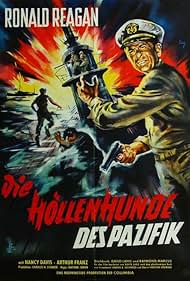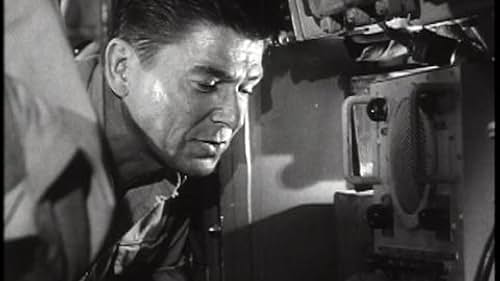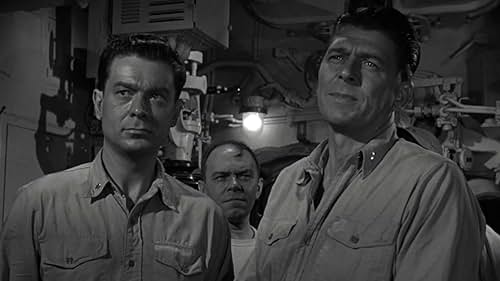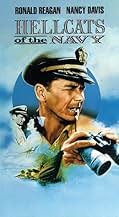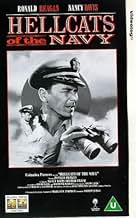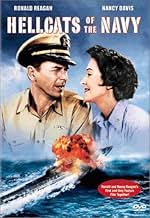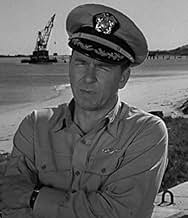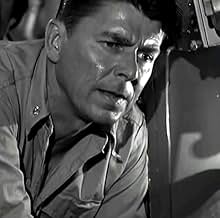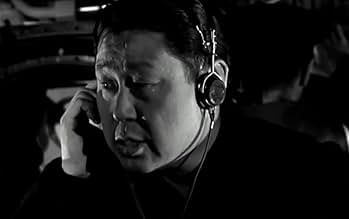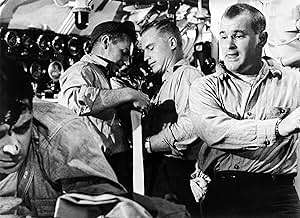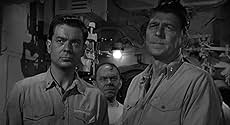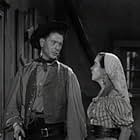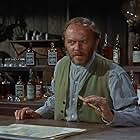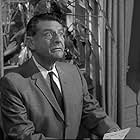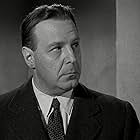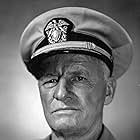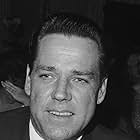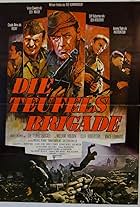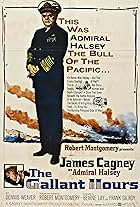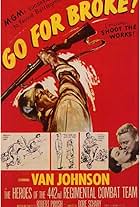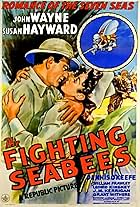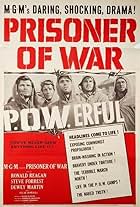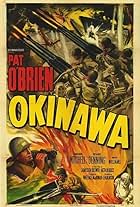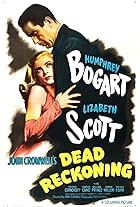IMDb-BEWERTUNG
5,6/10
1189
IHRE BEWERTUNG
Füge eine Handlung in deiner Sprache hinzuThe daring exploits of a submarine commander whose mission is to chart the minefields in the waters of Japan during World War II.The daring exploits of a submarine commander whose mission is to chart the minefields in the waters of Japan during World War II.The daring exploits of a submarine commander whose mission is to chart the minefields in the waters of Japan during World War II.
Nancy Reagan
- Nurse Lt. Helen Blair
- (as Nancy Davis)
William 'Bill' Phillips
- Carroll
- (as William Phillips)
Joe Turkel
- Chick
- (as Joseph Turkel)
Frank Chase
- Knife-Holding Sailor
- (Nicht genannt)
Vinnie De Carlo
- Sailor Dying on Sub Deck in Abbott's Arms
- (Nicht genannt)
James Dobson
- Ens. Bob Altman
- (Nicht genannt)
Thomas Browne Henry
- Board of Inquiry Chief
- (Nicht genannt)
Selmer Jackson
- Fleet Adm. Chester W. Nimitz
- (Nicht genannt)
Maurice Manson
- Vice-Adm. Charles A. Lockwood
- (Nicht genannt)
Chester W. Nimitz
- Self (in prologue)
- (Nicht genannt)
Bing Russell
- Frogman on Submarine
- (Nicht genannt)
Handlung
WUSSTEST DU SCHON:
- WissenswertesThis movie was the first and only time that former American President and actor Ronald Reagan and wife Nancy Reagan (aka Nancy Davis) star-teamed and made a movie together. The couple however did appear frequently together in television episodes of General Electric Theater (1953).
- PatzerThe SCUBA gear shown in the film was not available until after WWII.
- Crazy CreditsThe scenes used to show the island they are attacking are from the movie "Crash Dive"
- VerbindungenEdited from Der gelbe Strom (1955)
Ausgewählte Rezension
I first saw this movie in the early 1980's when WTBS of Atlanta (Ted Turner's "Superstation", which put itself on the cable TV map as the leading broadcaster of "vintage" movies at that time) started running it during Ronald Reagan's first presidential administration. At that time I found it noticeably unsettling to see the sitting President of the United States and the First Lady appearing in this manner (and maybe all the more so considering how I had voted for him, enthusiastically). Recently I got on a War in the Pacific kick and among other things decided to look at it again for the first time in years. A few points come to mind:
1. To begin with, the personal conflict which is proffered to serve as the backbone of this story is as badly contrived as any in the history of the movies. The executive officer's tirade and the position he took that prompted it was not only unwarranted, it was ridiculous. The behavior he displayed was not only immature, it just plain incompetent for someone in his position. Indeed, Reagan himself seemed to delay way too long himself in pulling the plug when he got the report of the rapidly closing radar contact -- just ask any submariner of the world war II era about these things (assuming you can find one, at this point). About the only kind thing I can say about this premise is that maybe with some detailed massaging of the script around this point there might have been some way to make it more plausible, but there is precious little that is subtly technical in this movie anyway, and indeed, some of the simpler technical aspects they did attempt to address were handled in too weak a way to be clear to a typical audience member who doesn't know anything about the US submarine campaign in World War II.
2. Having said that, this movie was not as bad as I remembered from my original viewing, or anticipated on commencing my recent one. There is actually some historical basis for the rest of the plot, and in terms of technical detail there is quite a bit that is pretty accurate, for a movie, even if it is by no means a perfect depiction of combat on a submarine of the era, and it indulges in all sorts of classic submarine movie clichés and characteristically highly improbable plot developments. The reference to "Hellcats" in the title was to one particular trio of wolfpacks of American submarines (which usually operated alone rather than in packs) which was nicknamed the Hellcats and organized for the purpose of a simultaneous mass raid on targets within the Sea of Japan in the last few months of the war, just as eventually indicated in the latter part of the movie.
3. Although Fleet Admiral Chester Nimitz was as important as anybody else in winning World Wart II, and held as much rank as Eisenhower or MacArthur, he never got the same kind of public attention they did (MacArthur being an egotist who actively courted media attention and Ike just being Ike), and as this movie shows he was not at all telegenic. Having so little star power, and regardless of his historical importance, comparing him to the two generals in connection with his appearance in a film is probably not entirely appropriate. A better question might be why he agreed to appear in it at all; I guess they simply asked him him to, and he couldn't tell the difference between Ronald Reagan and Clark Gable or John Wayne, or between an A-list movie and second-rate matinée-fodder, or maybe he didn't even care. I doubt seriously that in his rise to Pacific Ocean Areas Commander-in-Chief and Five Stars (the highest ranking admiral in an operational command in the history of the Navy) he probably had not paid more than cursory attention to the movie industry, lacking either the time, the interest, or both.
On the other hand, I figure that he was willing to lend his appearance to this thing as a way to plug the wartime Pacific Fleet Submarine Force, which didn't earn the nickname "Silent Service" because they were getting the attention and public adulation they deserved. In point of fact, almost one-third of the Japanese warships sunk in World War II were sunk by the US Pacific Fleet submarine force -- even though it amounted to less than 2% of the Navy's total personnel. As if that were not enough, they then went on to sink over 50% of Japan's merchant marine, i.e., commercial shipping, essentially strangling Dai Nippon, the Japanese Empire. As the Navy's designated submarine force historian noted in his official history of the American Pacific submarine offensive, the Atomic Bomb was just the funeral pyre for an enemy which had been drowned at sea. I can't imagine Nimitz, who was also a former submariner himself, not wanting to see that the force finally got the recognition it deserved among all of the up-till-then better-sung heroes of the war in the air and on land and even on the surface of the sea.
1. To begin with, the personal conflict which is proffered to serve as the backbone of this story is as badly contrived as any in the history of the movies. The executive officer's tirade and the position he took that prompted it was not only unwarranted, it was ridiculous. The behavior he displayed was not only immature, it just plain incompetent for someone in his position. Indeed, Reagan himself seemed to delay way too long himself in pulling the plug when he got the report of the rapidly closing radar contact -- just ask any submariner of the world war II era about these things (assuming you can find one, at this point). About the only kind thing I can say about this premise is that maybe with some detailed massaging of the script around this point there might have been some way to make it more plausible, but there is precious little that is subtly technical in this movie anyway, and indeed, some of the simpler technical aspects they did attempt to address were handled in too weak a way to be clear to a typical audience member who doesn't know anything about the US submarine campaign in World War II.
2. Having said that, this movie was not as bad as I remembered from my original viewing, or anticipated on commencing my recent one. There is actually some historical basis for the rest of the plot, and in terms of technical detail there is quite a bit that is pretty accurate, for a movie, even if it is by no means a perfect depiction of combat on a submarine of the era, and it indulges in all sorts of classic submarine movie clichés and characteristically highly improbable plot developments. The reference to "Hellcats" in the title was to one particular trio of wolfpacks of American submarines (which usually operated alone rather than in packs) which was nicknamed the Hellcats and organized for the purpose of a simultaneous mass raid on targets within the Sea of Japan in the last few months of the war, just as eventually indicated in the latter part of the movie.
3. Although Fleet Admiral Chester Nimitz was as important as anybody else in winning World Wart II, and held as much rank as Eisenhower or MacArthur, he never got the same kind of public attention they did (MacArthur being an egotist who actively courted media attention and Ike just being Ike), and as this movie shows he was not at all telegenic. Having so little star power, and regardless of his historical importance, comparing him to the two generals in connection with his appearance in a film is probably not entirely appropriate. A better question might be why he agreed to appear in it at all; I guess they simply asked him him to, and he couldn't tell the difference between Ronald Reagan and Clark Gable or John Wayne, or between an A-list movie and second-rate matinée-fodder, or maybe he didn't even care. I doubt seriously that in his rise to Pacific Ocean Areas Commander-in-Chief and Five Stars (the highest ranking admiral in an operational command in the history of the Navy) he probably had not paid more than cursory attention to the movie industry, lacking either the time, the interest, or both.
On the other hand, I figure that he was willing to lend his appearance to this thing as a way to plug the wartime Pacific Fleet Submarine Force, which didn't earn the nickname "Silent Service" because they were getting the attention and public adulation they deserved. In point of fact, almost one-third of the Japanese warships sunk in World War II were sunk by the US Pacific Fleet submarine force -- even though it amounted to less than 2% of the Navy's total personnel. As if that were not enough, they then went on to sink over 50% of Japan's merchant marine, i.e., commercial shipping, essentially strangling Dai Nippon, the Japanese Empire. As the Navy's designated submarine force historian noted in his official history of the American Pacific submarine offensive, the Atomic Bomb was just the funeral pyre for an enemy which had been drowned at sea. I can't imagine Nimitz, who was also a former submariner himself, not wanting to see that the force finally got the recognition it deserved among all of the up-till-then better-sung heroes of the war in the air and on land and even on the surface of the sea.
Top-Auswahl
Melde dich zum Bewerten an und greife auf die Watchlist für personalisierte Empfehlungen zu.
- How long is Hellcats of the Navy?Powered by Alexa
Details
- Laufzeit1 Stunde 22 Minuten
- Farbe
- Seitenverhältnis
- 1.85 : 1
Zu dieser Seite beitragen
Bearbeitung vorschlagen oder fehlenden Inhalt hinzufügen

Oberste Lücke
By what name was Die Höllenhunde des Pazifik (1957) officially released in India in English?
Antwort